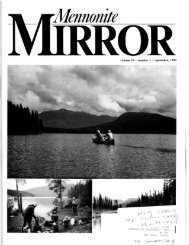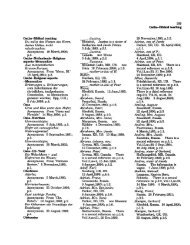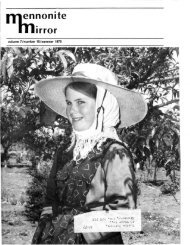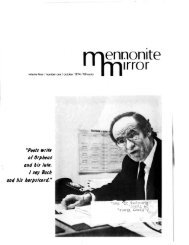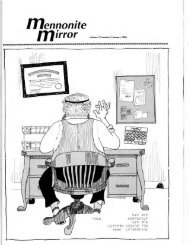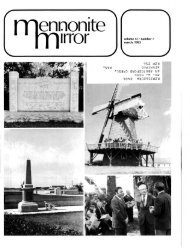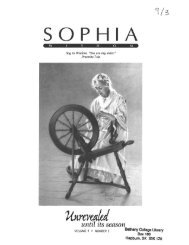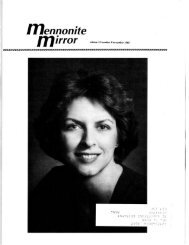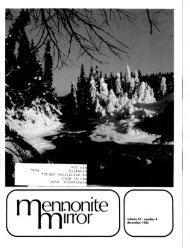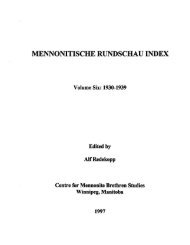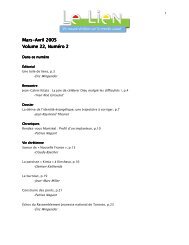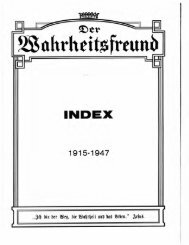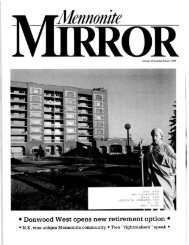mennonite mirror - Canadian Conference of Mennonite Brethren ...
mennonite mirror - Canadian Conference of Mennonite Brethren ...
mennonite mirror - Canadian Conference of Mennonite Brethren ...
You also want an ePaper? Increase the reach of your titles
YUMPU automatically turns print PDFs into web optimized ePapers that Google loves.
The immigrant: Part 5<br />
Looking for Work and .<br />
Memories <strong>of</strong> Martha Street<br />
by Victor Peters<br />
In the 1930's Winnipeg was a metropolis<br />
<strong>of</strong> about a quarter million people that<br />
still completely dominated the <strong>Canadian</strong><br />
West, from the Great Lakes to the<br />
Pacific. It had the country's largest rail<br />
centre, with the CPR and CNR main lines<br />
converging in the heart <strong>of</strong> the city, and<br />
then separating again ; other rail tracks<br />
led north to Churchill and south to St.<br />
Paul and Minneapolis. While Chicago<br />
dominated the American grain and meat<br />
market, Winnipeg's Grain Exchange<br />
determined grain prices in Canada and<br />
the city also housed some <strong>of</strong> the largest<br />
meat packing plants in the nation.<br />
The Catalogues from Winnipeg's<br />
department stores, especially those <strong>of</strong><br />
the Eaton company, could be found in<br />
the remotest outhouses on the prairies.<br />
Indeed, the larger than life bronze statue<br />
<strong>of</strong> the founder <strong>of</strong> that firm occupied a<br />
dominant position in the downtown<br />
store and was a favorite meeting place<br />
for city shoppers, whether they came<br />
from town or country. One <strong>of</strong> the Winnipeg<br />
dailies, the Free Press, had the<br />
reputation that it was the nat ion 's most<br />
influential and best edited newspaper.<br />
The great implement companies, International<br />
Harvester, Massey-Harris, John<br />
Deere, and others, used Winnipeg as a<br />
base to assemble and supply the equipment<br />
used by the farmers and ranchers<br />
<strong>of</strong> half a continent. The businessmen,<br />
managers, and executives who directed<br />
this diversified economic empire lived in<br />
luxurious and· stately homes on Wellington<br />
Crescent, some <strong>of</strong> them occasionally<br />
being driven to work not in an ordinary<br />
Cadfllac or Packard but' in a •<br />
coach-and-four.<br />
I did not, <strong>of</strong> course, expect to take up<br />
tenancy in one <strong>of</strong> these homes. An acquaintance,<br />
the young man who had had<br />
the accident with the buzz-saw, had married<br />
and taken over a rooming house, and<br />
that is where I went. The rooming house<br />
was located on Martha street, near<br />
Logan , and even in those days it was one<br />
<strong>of</strong> the seediest areas in the city. The<br />
house is there no longer. Where it stood<br />
is now the street entry to the Disraeli<br />
Freeway. I don't remember how many<br />
rooms the house had, but each room had<br />
about four to eight single beds. The cost<br />
<strong>of</strong> a bed was 25 cents if you paid by the<br />
night, 15 cents if you paid by the week. A<br />
short block down Logan was Main Street<br />
with a wide selection <strong>of</strong> restaurants and<br />
cafes, most <strong>of</strong> them in Chinese hands.<br />
The cooks were Chinese, the waitresses<br />
were white, the food was American . A<br />
full meal with soup, main course, like<br />
liver, bacon, and onions, a generous<br />
slice <strong>of</strong> pie with whipped cream on it,<br />
and c<strong>of</strong>fee, cost 25 cents. You could eat<br />
as much bread as you liked. But on<br />
Logan just before Main Street, near the<br />
public comfort station and across from<br />
the Salvation Army hostel you could<br />
have almost the same meal for 15 cents.<br />
Since my reserves were small I ate once<br />
a day. Towels and bedding were supplied<br />
by the rooming house. We washed our<br />
personal laundry in the washbasin, the<br />
dress shirts were taken to a regular laundry.<br />
There were Quite a few in the area,<br />
and most <strong>of</strong> them were owned and<br />
operated by Chinese. The service provided<br />
by the Chinese community was<br />
outstanding. On reflection I cannot<br />
remember having ever heard a patron<br />
complain either <strong>of</strong> the food in the<br />
restaurants or the service at the laundry.<br />
In the rooming house the occupants <strong>of</strong><br />
the beds were usually young men , many<br />
<strong>of</strong> them much more experienced than I<br />
was a\ that time. Though I lived in rooming<br />
houses in Winnipeg for two years I<br />
never met a homosexual. Many <strong>of</strong> the<br />
men were transients who spent 'most <strong>of</strong><br />
their time riding freight trains, looking<br />
for work. A school-friend <strong>of</strong> mine from<br />
Winkler, Victor Unruh, in one summer<br />
crossed the country from Halifax to Vancouver<br />
six times. Most <strong>of</strong> the "roomers"<br />
had meal tickets which permitted them<br />
to have two meals a day at a government<br />
soup kitchen. The tickets were punched<br />
every day at the door, and if the ticketholder<br />
did not use them regularly his<br />
tickets were invalidated. When a holder<br />
found temporary employment he would<br />
be unable to eat at the soup kitchen. In<br />
order not to forfeit his meal tickets he<br />
would <strong>of</strong>fer them for use to a friend who<br />
did not have them. I sometimes helpe~<br />
out an acquaintance (and myself) by using<br />
his ticket and having it punched. No<br />
one stayed with the government meal<br />
tickets unless he had to. The soup in the<br />
soup kitchens consisted mostly <strong>of</strong><br />
water, and the rest <strong>of</strong> the meal was<br />
equally unsatisfactory. The men at the<br />
long tables (there were no women) looked<br />
wan and wasted. Quite <strong>of</strong>ten a man<br />
standing in line would collapse from<br />
weakness and undernourishment. He<br />
would then be carried to a bench or propped<br />
up against the table where he would<br />
stay until he recovered, while the men<br />
around him sipped their soup. There<br />
were quite a few young <strong>Mennonite</strong> men<br />
like myself but practically none <strong>of</strong> them<br />
had meal tickets. The home influence<br />
with its prejudice against government<br />
assistance was not . that easily broken<br />
down.<br />
Life at the rooming house was not<br />
altogether dull. Some <strong>of</strong> the men had<br />
work and were gone all day. The others<br />
looked for work in the morning and spent<br />
the rest <strong>of</strong> the day reading or loitering in<br />
the public parks. In the afternoon some<br />
<strong>of</strong> the men would spraWl out on the cots<br />
and either engage in conversation or<br />
read. Usually one or two <strong>of</strong> the ' men<br />
would sit at the large window facing<br />
Logan and watch the city hookers get<br />
their clients from the corner at Main<br />
Street or from the Sal.vation Army hostel.<br />
Most <strong>of</strong> the hookers were long past their<br />
prime, and some <strong>of</strong> them looked very<br />
shabby, but usually not worse than their<br />
patrons. Sometimes the men at the window<br />
would keep count how <strong>of</strong>ten a certain<br />
woman would take in a man. She<br />
rarely accompanied him going back to<br />
Main Street. Men who knew about these<br />
things said that the cost was 25 cents "a<br />
throw," but that some <strong>of</strong> the women<br />
charged as much as half a dollar.<br />
For a week I looked for work at<br />
wholesale warehouses and at the meat<br />
packing plants. The practice was to be at<br />
the place early and wait at the employment<br />
<strong>of</strong>fice. If the place was too crowded,<br />
you waited outside_ Your opportunity<br />
came when one <strong>of</strong> the regular workers<br />
failed to show up, either because he was<br />
ill or there had been a death In the family,<br />
<strong>mennonite</strong> <strong>mirror</strong> 1 may 1977/11



